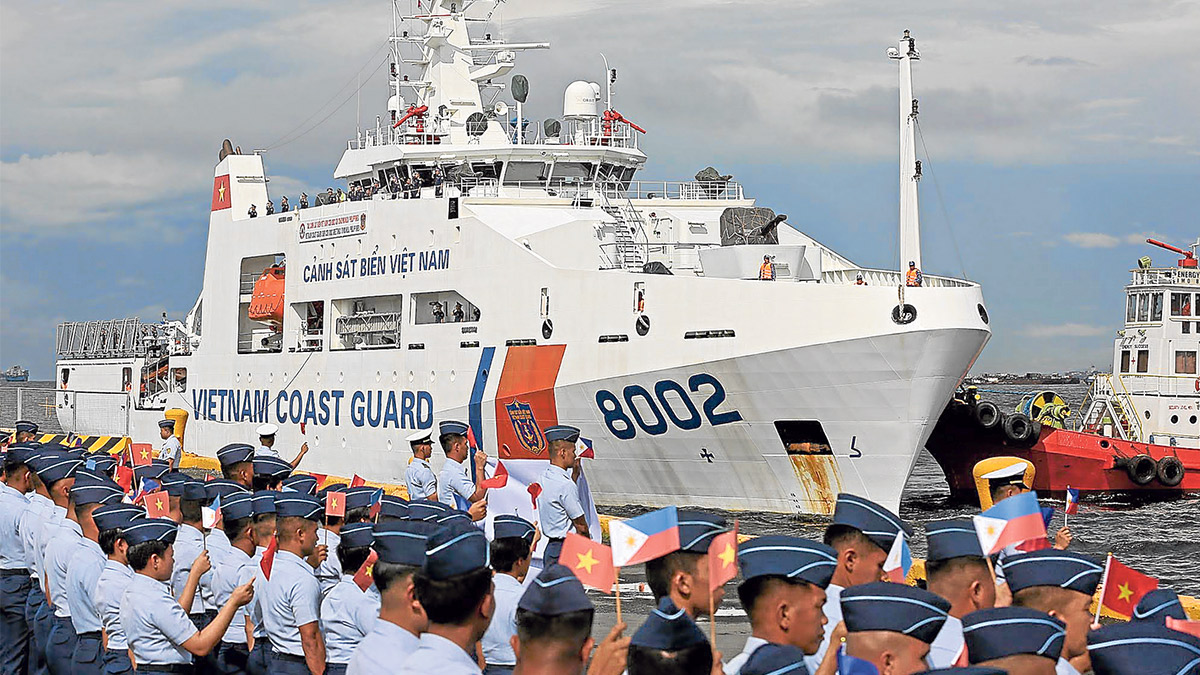
PORT CALL Members of the Philippine Coast Guard on August 5, 2024, welcome Vietnam Coast Guard CSB 8002 and its crew at South Harbor in Manila for a five-day port call. The coast guards of the two countries will hold joint exercises for search and rescue, and fire and explosion prevention training. INQUIRER file photo / RICHARD A. REYES
MANILA, Philippines — The Philippine Coast Guard (PCG) will send a ship to visit Vietnam before the end of 2024 as Manila and Hanoi continue to enhance their maritime cooperation due to shared threats and despite overlapping claims in the South China Sea.
For the first time, Vietnam Coast Guard (VCG) sent its ship to Manila for a five-day visit which culminated in the maritime drills in the West Philippine Sea.
READ: ‘Revolutionary’: Vietnam coast guard sets first-time drills with PCG
“As a result of the successful visit, the PCG will begin planning and preparations to send one of its ships to Vietnam later this year to reciprocate the gesture of goodwill, strengthen ongoing PCG-VCG cooperation, and further test interoperability in maritime law enforcement and search and rescue operations,” the PCG said in a statement.
VCG ship CSB 8002 joined PCG’s BRP Gabriela Silang in conducting the water cannon practice within the vicinity of Corregidor Island. But unlike Beijing, who has used water cannons to derail the maritime operations of Manila and Hanoi, the coast guard of both nations employed it for fire and explosion prevention purposes.
READ: Vietnam, PCG use water cannon in West Philippine Sea drills
Manila and Hanoi maintain close diplomatic ties despite their overlapping claims in the maritime features in the South China Sea, parts of which it refers to as the West Philippine Sea and East Sea, respectively.
Both countries experienced hostile actions from Beijing, who asserts sovereignty in the entire South China Sea despite a landmark international ruling in 2016 effectively dismissing its claims.
“We focus on these common goals and interests, as we set aside our differences,” said PCG chief Admiral Ronnie Gil Gavan during a speech.
“The relationship between the PCG and the VCG has always been one of mutual respect and trust.”
Also, VCG Region 2 Vice Commander Colonel Hoang Quoc Dat called the visit “a significant point in our bilateral relationship.”
“After this port visit, I trust that the two sides will continue to collaborate by participating in a growing number of profitable, diversified cooperative projects that have the potential to yield a variety of tangible outcomes,” Hoang also said.
Geopolitical expert Don McLain Gill said the recent collaboration of both countries “shows a message of pragmatism” due to their “shared interests.”
“While both still maintain their claims, the overarching illustration is that in order to resolve these disputes, confidence building and more enhanced collaborations in the maritime domain are needed,” Gill, lecturer at the De La Salle University’s Department of International Studies, told INQUIRER.net.
Gill continued: “This further sends a message to China that if it becomes more belligerent, it is likely for Manila and Hanoi to push their partnership further.”
